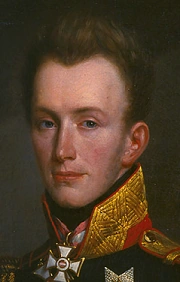
| |
| Prince William | |
| Medium: | Television, Book, Reality |
| Also known as: | Slender Billy, Silly Billy |
| Nationality: | Dutch |
| Rank: | Prince |
| Appearances: | Sharpe's Waterloo |
| Actor: | Paul Bettany |
William II (Willem Frederik George Lodewijk, anglicized as William Frederick George Louis; 6 December 1792 – 17 March 1849) was King of the Netherlands, Grand Duke of Luxembourg, and Duke of Limburg.
Novels
In the novel Waterloo, the Prince of Orange was described as having an easy nature, but needing to demonstrate his command, even to the point of demanding Sharpe appear at a ball and dance, while ignoring promises to Sharpe that his duties would be strictly military and not social.
The Prince of Orange's time on Wellington's staff, where he had been kept away from all fighting, had "convinced [him] he had a fine talent for soldiering," and with the return of Napoleon, had hired Sharpe for his staff, granting him the rank of Lieutenant-Colonel, because in the famous soldier he hoped to find a kindred spirit. He did not.
The prince is shown to have exposed infantry to cavalry three separate times. Sharpe eventually feels compelled to remove the Prince from the field to protect the men, and subtly arranges events so that he may shoot the man unobserved by any but Patrick Harper. The prince is wounded enough to remove him from the field.
Televison
In the TV movie Sharpe's Waterloo, the Prince of Orange was an officer at the Battle of Waterloo. He had hired the professional soldier, Richard Sharpe, for his staff on Wellington's advice, eventually earning Sharpe's contempt for his refusal to take advice to protect the men under him and his overbearing pretentiousness.

Paul Bettany as Prince William of Orange
The Prince refused to order his men to adopt a square formation despite the presence of French cavalry, which lead to the infantry taking heavy casualties. Later in battle, he was trapped at La Haye Sainte, and deciding to attempt to flee, he ordered the gate be opened. The in rush of French troops lead to high casualties among the defenders and numerous deaths, including Riflemen Hagman and Harris.
Sharpe's grief at the loss of his two friends, and his hope of preventing the Prince from costing more lives with his blunders, led him to attempt to assassinate the Prince, who escaped only wounded.
Historical Accuracy
The depiction of William of Orange by Cornwell carries on the continuing historic argument about the usefulness of the Prince. Not everyone agrees that he was the complete incompetent portrayed in Sharpe, but most agree that he was woefully inexperienced in the field. While the Prince is noted by some for gallant actions during the campaign, he also was involved in the destruction of several Allied Battalions by French cavalry, taking heavy casualties and loss of colours for no good reason except to exert his authority. He did, for instance, order the KGL into line while trying to retake La Haye Saint, but the French Cavalry were watching, and even when the KGL officers tried to reason with him to protect the men, he insisted on keeping them advancing in line, and they paid a very heavy price. He was simply not a good field commander.
By Waterloo, Slender Billy had been an officer for a few years on Wellington's staff, Wellington thought the the Prince, was "a dissolute, untidy, and stupid young man." In the end, however, the Prince of Orange was likely both good and bad. He may well have tried his utmost to be a good field soldier, but his lack of experience as a Corp commander let him - and his men - down badly.
